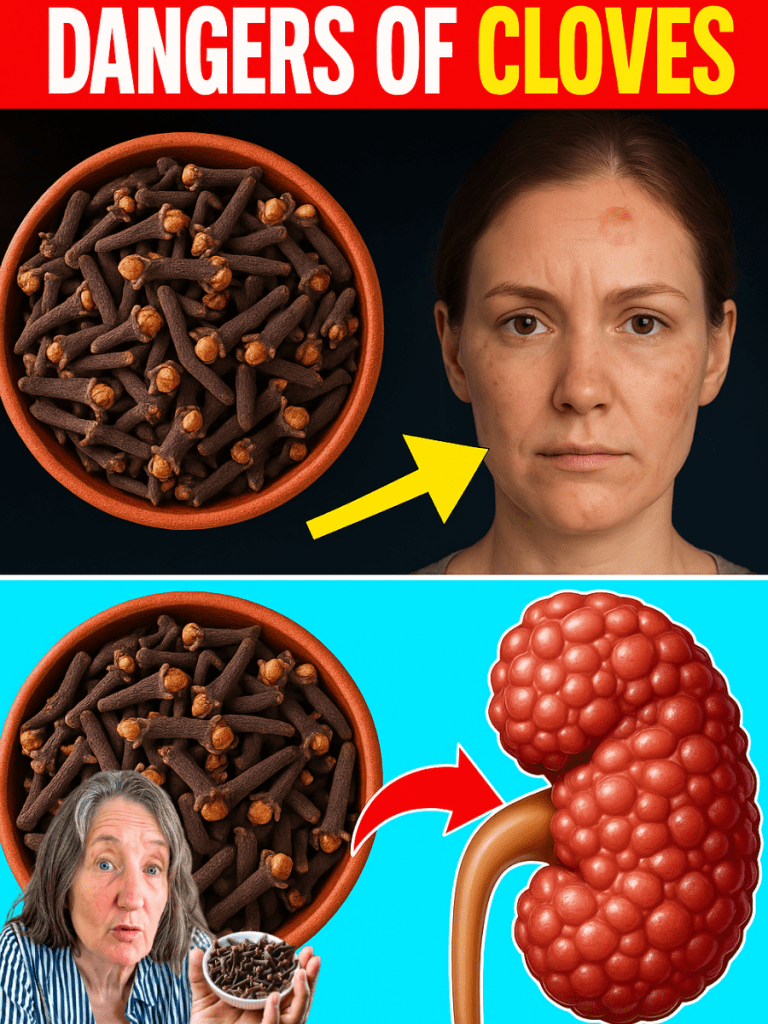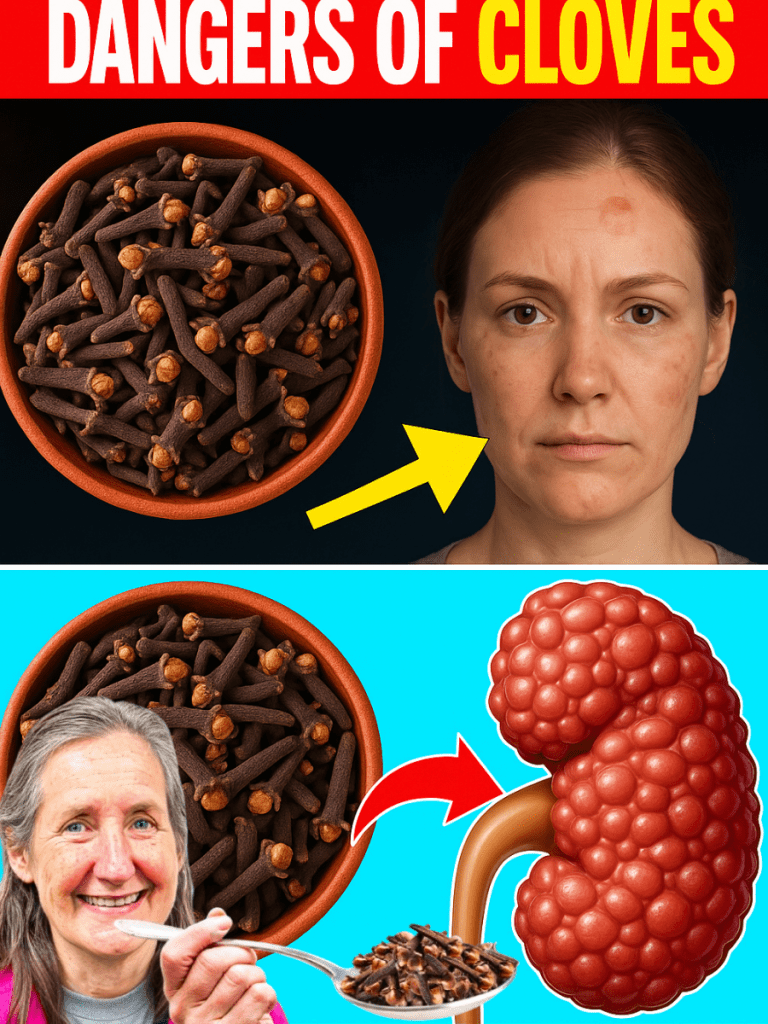Cloves. Those tiny, aromatic buds that pack a punch in your favorite recipes and wellness routines. Celebrated for their bold flavor and touted for their antioxidant and anti-inflammatory powers, cloves have earned a reputation as a super-spice. From soothing toothaches to boosting immunity, they seem like nature’s perfect remedy. But here’s the shocking truth: cloves aren’t the harmless wonder-spice you think they are. For some, they could spell trouble—serious trouble.
If you’re one of the millions who sprinkle cloves into your meals, sip them in teas, or dab on clove oil for health benefits, this article is your wake-up call. Beneath their alluring aroma lies a hidden side that doctors rarely warn you about. Certain health conditions can turn cloves from a healing hero into a dangerous villain. Ready to uncover the risks? Let’s dive into the nine critical reasons you might need to rethink cloves—and how they could be silently harming you.

🔥 1. Acid Reflux or GERD? Cloves Could Set Your Chest Ablaze
Love that warm, spicy kick cloves add to your dishes? If you suffer from acid reflux or gastroesophageal reflux disease (GERD), you might want to hold off. Cloves contain eugenol, a potent compound that relaxes muscles, including the lower esophageal sphincter. This muscle acts like a gatekeeper, preventing stomach acid from creeping into your esophagus. When it relaxes too much, acid flows upward, triggering that agonizing heartburn you dread.
For the 20% of adults battling GERD, cloves can intensify symptoms like burning pain, bloating, and regurgitation. Instead of soothing your stomach, they could leave you reaching for antacids. If acid reflux is a frequent foe, skip the cloves—or at least consult your doctor before indulging. Your esophagus will thank you.
💉 2. Blood Thinners or Bleeding Disorders? Cl cloves Could Spell Disaster
Cloves are a natural blood thinner, which sounds like a heart-healthy perk. Their eugenol content helps improve circulation and reduce clotting. But for those on medications like warfarin, aspirin, or other anticoagulants, or anyone with bleeding disorders like hemophilia, this is a red flag. Combining cloves with blood-thinning drugs could amplify their effects, raising your risk of bruising, nosebleeds, or even internal bleeding.
Imagine a minor cut turning into a major problem or a routine surgery becoming risky. If you’re on blood thinners or have a clotting disorder, cloves aren’t your friend. Always check with your healthcare provider before adding them to your diet or using clove oil. One small spice could have oversized consequences.
🤧 3. Spice Allergies? Cloves Might Trigger a Sneezing Storm
If you’re sensitive to spices or plants in the Myrtaceae family—like eucalyptus, guava, or allspice—cloves could spark an allergic reaction. Symptoms range from mild itching and rashes to swelling, breathing difficulties, or even anaphylaxis in rare cases. The eugenol in cloves, while beneficial for some, can be an allergen for others, especially if you’re prone to spice sensitivities.
Before you dive into that clove-infused chai or apply clove oil, do a patch test. Start with a tiny amount to see how your body reacts. Ignoring this could turn a cozy evening into a frantic trip to the pharmacy—or worse. Stay cautious and keep your allergies in check.
🤰 4. Pregnant or Breastfeeding? Cloves Could Pose Risks to You and Your Baby
Pregnant women often turn to natural remedies to ease discomforts like nausea or tooth pain. Cloves might seem like a safe bet, but not so fast. High doses of cloves or clove oil can stimulate uterine contractions, potentially increasing the risk of preterm labor, especially in the first trimester. For breastfeeding moms, eugenol can pass through breast milk, possibly affecting your baby’s sensitive system.
While small culinary amounts are generally safe, medicinal doses or clove oil are a gamble. If you’re expecting or nursing, consult your obstetrician before using cloves in any form. Your baby’s health isn’t worth the risk.
🧬 5. Liver Problems? Cloves Could Overwhelm Your System
Cloves are packed with eugenol, a compound that’s a double-edged sword. In small doses, it’s a powerful antioxidant. In large amounts, it’s toxic to the liver. For those with liver conditions like hepatitis, fatty liver disease, or cirrhosis, cloves—especially clove oil—can strain an already struggling organ. Studies suggest excessive eugenol may cause liver damage, particularly when consumed regularly or in concentrated forms.
If your liver is under stress, steer clear of clove supplements, oils, or heavy culinary use. Opt for safer alternatives and work with your doctor to protect your liver. Don’t let a spice sabotage your health.
🧯 6. Stomach Ulcers or Gastritis? Cloves Might Fan the Flames
Cloves are often praised for aiding digestion, but for those with stomach ulcers or gastritis, they can backfire. The same compounds that stimulate digestion can irritate an inflamed stomach lining, worsening pain, nausea, or acid production. If you’re dealing with a sensitive gut, cloves might turn a mild ache into a full-blown flare-up.
Stick to gentler remedies like ginger or chamomile if your stomach is prone to trouble. Always listen to your body—if cloves make your symptoms worse, they’re not worth the hype. Consult a gastroenterologist for personalized advice.

🩸 7. Low Blood Sugar? Cloves Could Send You Spiraling
Cloves are celebrated for their blood sugar-regulating properties, which can benefit those with diabetes. But if you’re prone to hypoglycemia (low blood sugar), this spice could push you into dangerous territory. Eugenol and other compounds in cloves can enhance insulin sensitivity, potentially dropping your blood sugar too low, too fast. Symptoms like dizziness, shakiness, or fainting could follow.
If you’re hypoglycemic or on medications that lower blood sugar, monitor your clove intake closely. A small pinch in your oatmeal might be fine, but clove-heavy recipes or supplements could spell trouble. Check with your doctor to stay safe.
🚱 8. Kidney Issues? Cloves Might Overload Your System
Your kidneys work hard to filter toxins, but cloves—especially in large doses or as concentrated oils—can add unnecessary strain. For those with chronic kidney disease or reduced kidney function, the eugenol in cloves may accumulate, potentially worsening kidney health. Animal studies have hinted at renal toxicity from excessive clove use, though human research is limited.
If your kidneys are compromised, limit cloves to small culinary amounts and avoid clove oil entirely unless prescribed. Your nephrologist can guide you on what’s safe for your condition. Don’t let a spice jeopardize your kidney function.
🚫 9. Sensitive Skin? Clove Oil Could Burn More Than It Heals
Clove oil is a go-to for toothaches, acne, or muscle pain, but its potency is a double-edged sword. Undiluted or overused, it can irritate or even burn sensitive skin, causing redness, stinging, or blisters. For those with eczema, psoriasis, or naturally sensitive skin, clove oil is a risky choice. Applying it to broken skin or open wounds is an even bigger no-no.
Always dilute clove oil with a carrier like coconut or jojoba oil, and do a patch test before widespread use. If irritation occurs, rinse immediately and consult a dermatologist. Natural doesn’t mean gentle—handle with care.
✅ The Bottom Line: Cloves Aren’t a One-Size-Fits-All Superfood
Cloves are undeniably powerful. Their antioxidant, anti-inflammatory, and antimicrobial properties make them a staple in kitchens and medicine cabinets worldwide. But power comes with responsibility. For people with acid reflux, bleeding disorders, allergies, liver or kidney issues, sensitive skin, or those who are pregnant, breastfeeding, or hypoglycemic, cloves can do more harm than good.
Here’s who should hit pause on cloves:
- Those battling GERD, ulcers, or gastritis
- People on blood thinners or with clotting disorders
- Pregnant or breastfeeding women
- Individuals with liver or kidney conditions
- Anyone with spice allergies or sensitive skin
Moderation is key. A pinch of ground cloves in your pumpkin pie or a drop of diluted clove oil for a toothache is usually safe for most. But heavy use, especially in supplements or undiluted oils, can tip the scales from beneficial to dangerous.
👉 Your Next Steps: Stay Safe, Stay Informed
Before you toss cloves into your next recipe or wellness routine, take a moment to assess your health. Are you in one of the at-risk groups? If so, talk to your doctor or a nutritionist. They can help you decide if cloves are safe for you and in what amounts. When using clove oil, always dilute it and test it on a small patch of skin first.
Choose high-quality, whole cloves or reputable essential oils from trusted sources to avoid contaminants. And remember: natural remedies are powerful, but they’re not always safe for everyone. Your health deserves more than a one-size-fits-all approach.
🧠 Final Thought: Knowledge Is Your Best Defense
Cloves may be small, but their impact can be massive—for better or worse. By understanding their risks, you’re taking control of your health. Don’t let a trendy spice catch you off guard. Stay curious, stay cautious, and make choices that keep you thriving.









